In recent years, artificial intelligence (AI) has gained a strong presence in customer service, especially in call centers. AI tools, such as chatbots and virtual assistants, have become essential for handling routine tasks and providing quick support. But as AI technology advances, many wonder: Will AI eventually replace human call center agents? This article explores AI’s current role, its limitations, and why humans remain essential in delivering high-quality customer service.
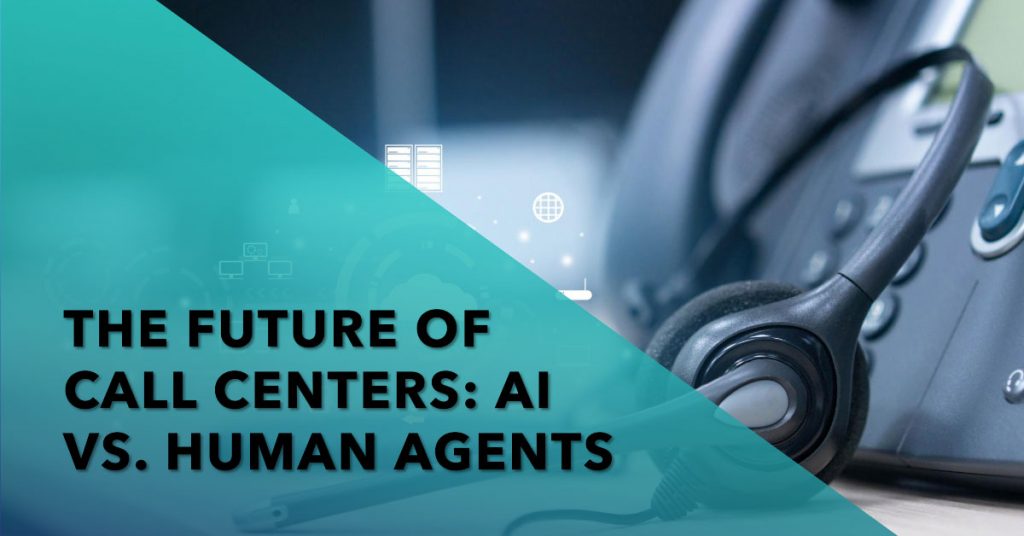
Understanding the strengths and weaknesses of AI in call centers helps us predict how AI and humans will work together to shape the future of customer service.
🤖 The Current Role of AI in Call Centers
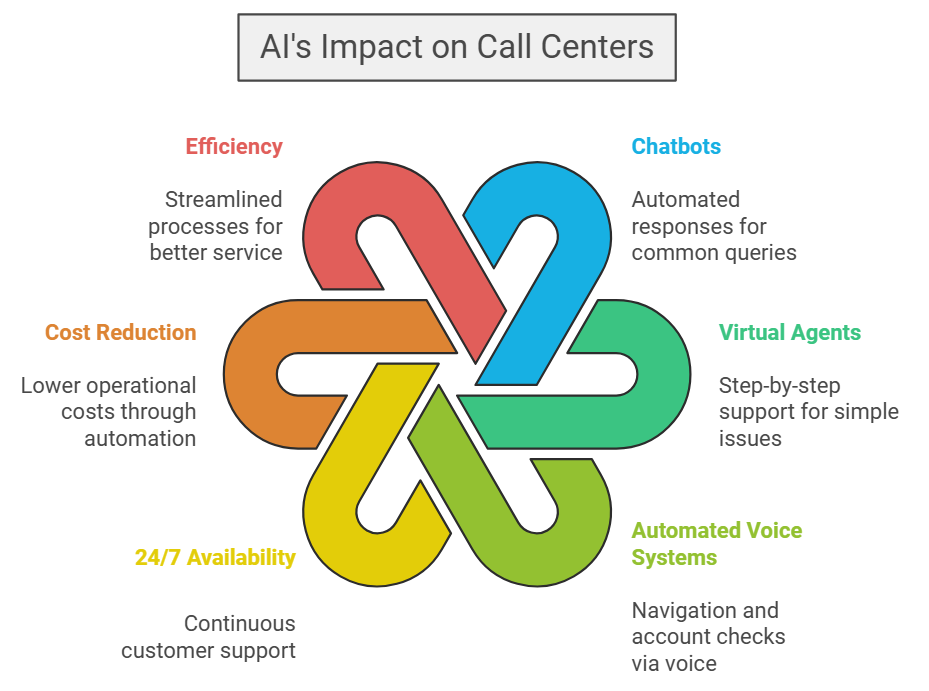
AI technology plays a major role in supporting customer service teams. Many call centers use chatbots and virtual agents to answer basic questions, such as FAQs about products, services, or billing. This allows customers to get quick answers without waiting for a live agent.
Voice recognition systems are another popular AI tool. These systems allow customers to use voice commands, making it easier to navigate phone menus or complete simple tasks, like checking account balances or updating personal information. Voice recognition systems are part of advanced AI contact center features that improve customer experience and reduce waiting times.
Benefits of AI for Call Centers
AI technology brings several benefits to call centers. 24/7 availability is a key advantage—AI can operate continuously, ensuring customers receive support anytime. Another benefit is cost reduction through automation, which lowers the need for large customer service teams. This efficiency frees human agents to handle more complex tasks and provides businesses with scalable solutions for managing inquiries.
Common AI Tools Used in Call Centers
Some popular AI tools in call centers include:
- Chatbots for handling common questions and assisting with basic requests.
- Virtual agents that can provide step-by-step support for simple issues.
- Automated voice systems that help customers navigate phone menus or check account information.
These tools improve service efficiency and offer a smoother experience for customers looking for quick answers.
🚫 Limitations of AI in Customer Service
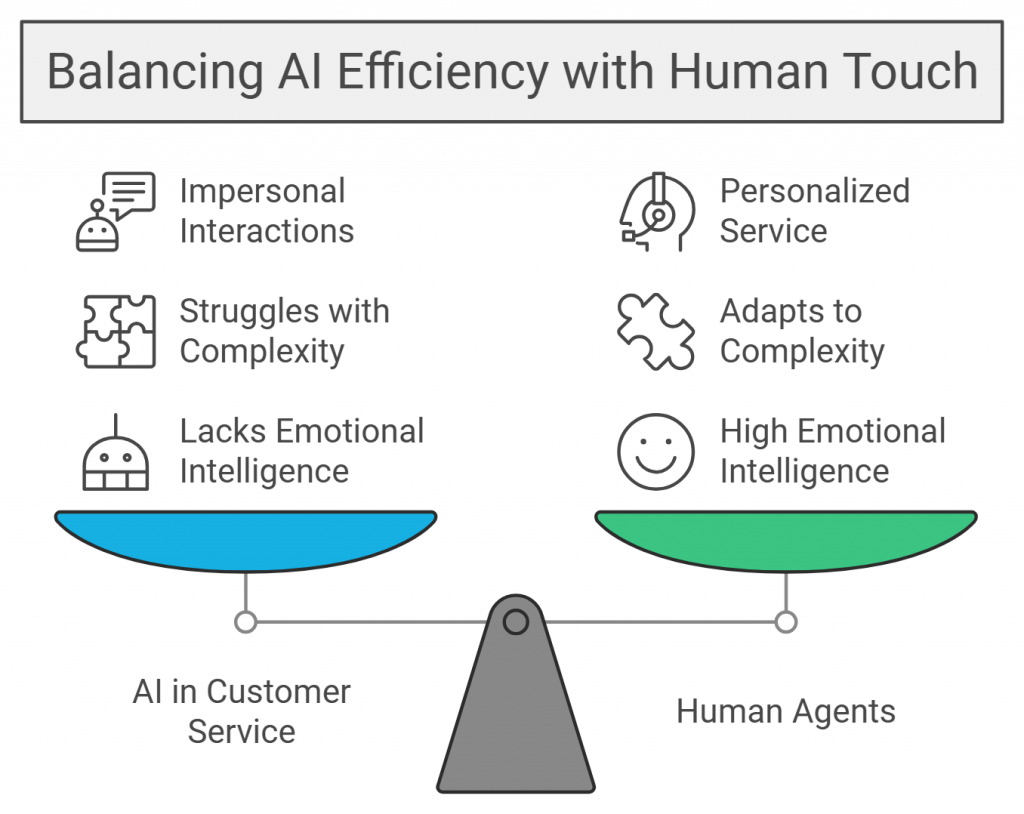
1. AI Lacks Emotional Intelligence
While AI excels at automation, it struggles with nuanced customer interactions. Companies focused on enhancing customer satisfaction often rely on human agents to address emotional needs. Empathy and problem-solving are areas where AI-driven solutions currently fall short. Still there are predictions that we will soon have emotional ai as well as a solution to this problem.
2. Challenges with Complex Problem-Solving
AI struggles with complex problem-solving. While it can quickly retrieve information, AI often lacks the flexibility to handle unique or complex requests. Human agents are skilled at thinking on their feet, adapting their approach based on the situation, and making decisions that require judgment. For example, a human agent can recognize when a customer needs an exception to a policy and may escalate the case to find a solution, whereas an AI system is usually limited to pre-defined responses. This limitation of AI makes it hard to resolve issues that fall outside of standard procedures.
3. Customer Frustrations with Automated Responses
Customers can become frustrated when they only interact with automated systems. Many customers prefer to speak with a human when dealing with sensitive or urgent issues. When AI responses feel impersonal or too scripted, it can lead to dissatisfaction. For instance, a customer calling with a billing dispute may become irritated if they’re repeatedly redirected by an automated system instead of reaching a person who can address their concern.
These limitations highlight why AI alone cannot deliver a complete customer service experience. Human agents remain necessary for tasks that require emotional understanding, adaptability, and complex problem-solving.
👥 Why Human Agents are Still Essential in Call Centers
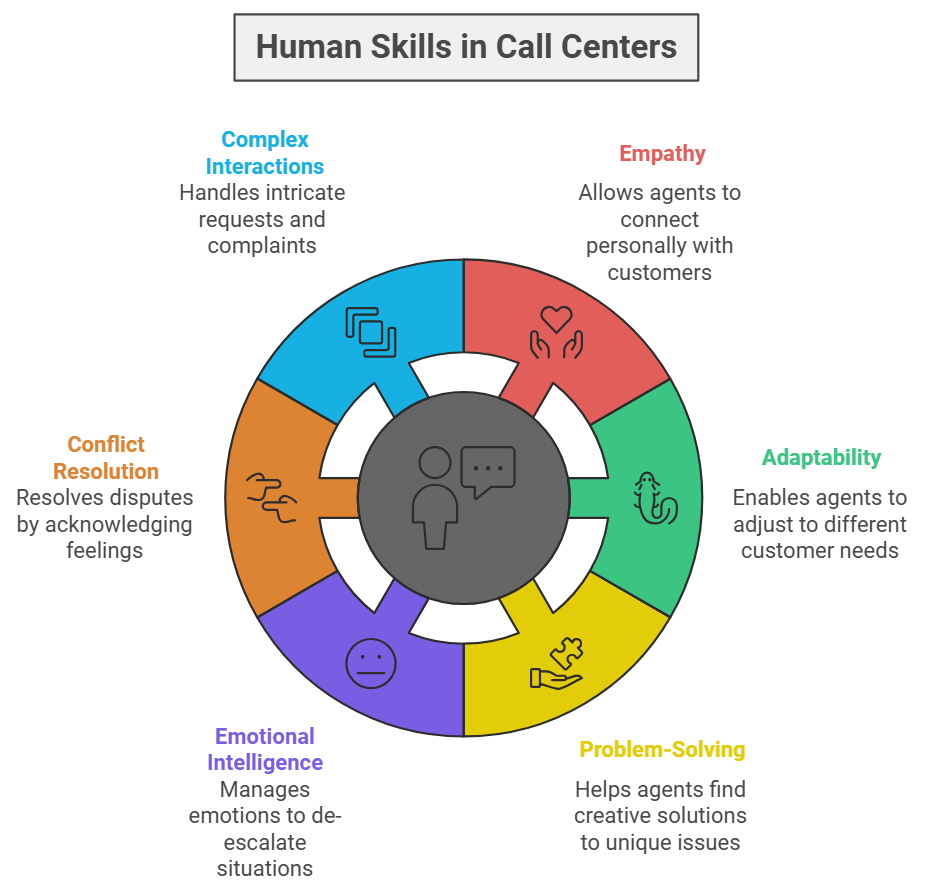
Human agents bring unique skills to customer service that AI cannot replicate. Empathy allows human agents to connect with customers on a personal level, which is especially valuable when handling sensitive issues. Adaptability enables them to adjust their approach based on each customer’s tone, mood, and needs. Finally, problem-solving is a critical skill that allows agents to find creative solutions to issues that don’t fit standard responses.
These skills make human agents irreplaceable in situations that require personal judgment and understanding. Unlike AI, human agents can read between the lines, picking up on unspoken cues that help them provide a satisfying, personalized experience for each customer.
The Role of Emotional Intelligence
Emotional intelligence is a core strength of human agents in customer service. This skill helps agents manage their own emotions and respond to customers in a calm, empathetic manner. For instance, if a customer is upset, an agent with high emotional intelligence can adjust their tone and approach to de-escalate the situation. This type of responsiveness builds trust and reassures customers that they are being heard and understood.
Emotional intelligence is also critical for conflict resolution. When issues arise that cannot be resolved through standard policies, a human agent can listen actively, acknowledge the customer’s feelings, and work toward a solution that feels fair. This ability to manage emotional interactions is a key reason why human agents remain essential in call centers.
Complex Interactions and Escalations
In customer service, not all interactions are straightforward. Complex requests or customer complaints often require human intervention. For example, a customer may call to dispute a charge, request a refund, or ask for an exception to a policy. In these cases, a human agent can evaluate the situation, consider the customer’s history, and offer a customized response.
Escalations also require human judgment. When issues cannot be resolved at a basic level, they often need to be transferred to higher support tiers where experienced agents can assess and address the problem. Human agents are uniquely qualified for these tasks because they can make decisions based on context, empathy, and a holistic understanding of the situation.
🧩 The Hybrid Model: AI and Human Collaboration
The hybrid model ensures that businesses leverage the strengths of both AI and human agents. AI efficiently manages repetitive inquiries like call routing, while human agents focus on escalations and unique scenarios requiring a personal touch. For example, real estate call centers use AI to automate inquiries, freeing agents to close deals and manage high-value interactions.
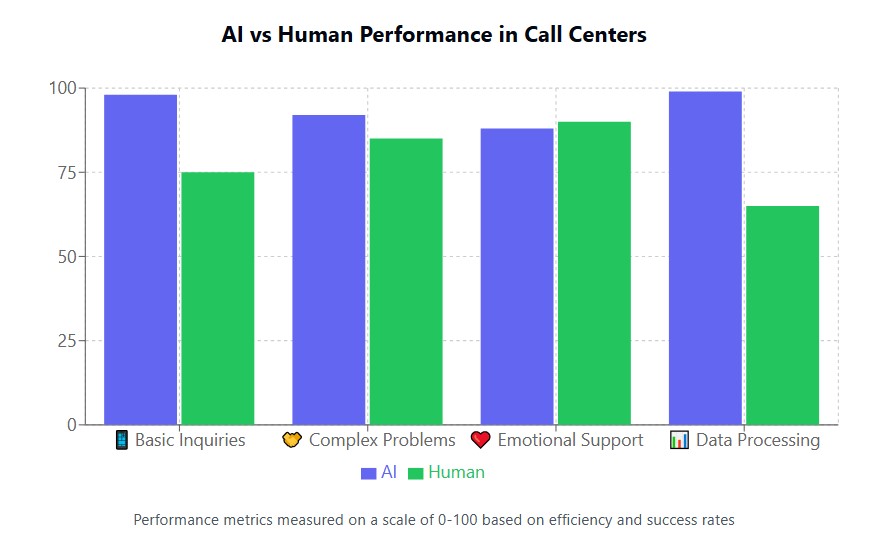
What is the Hybrid Model?
The hybrid model is a customer service approach that combines AI and human agents, leveraging the strengths of both. In this model, AI handles routine tasks, allowing human agents to focus on more complex interactions. The hybrid model ensures efficiency while maintaining the human touch that customers value. This approach is increasingly popular as businesses seek to improve customer experience and streamline operations.
AI Handling Routine Tasks
In a hybrid call center, AI technology takes care of simple, repetitive tasks. This includes answering frequently asked questions, directing calls, and providing basic account information. By handling these routine interactions, AI reduces the workload on human agents, ensuring customers get faster responses to simple inquiries.
This setup allows human agents to focus on calls that require personal attention. For example, when a customer has a unique issue or requires emotional support, the interaction can be seamlessly transferred to a human agent. AI’s role here is to manage high-volume tasks efficiently, creating more space for agents to dedicate time to cases that require critical thinking.
Human Agents as Problem Solvers
In the hybrid model, human agents are positioned as problem solvers. While AI can manage straightforward tasks, human agents handle high-stakes interactions where empathy, judgment, and flexibility are essential. For example, a customer dealing with a complex billing issue or a technical problem will benefit from talking to a person who can understand their specific needs.
Human agents can adjust their approach based on context and offer a customized experience. This blend of AI efficiency and human sensitivity ensures that customer service is both fast and satisfying.
Benefits of the Hybrid Model
The hybrid model offers several advantages:
- Efficiency: AI handles high volumes of routine inquiries, reducing wait times for customers.
- Cost Savings: By automating simple tasks, businesses can lower operational costs.
- Improved Customer Satisfaction: Customers receive faster responses for basic issues and more attentive service for complex ones.
- Agent Productivity: Human agents are free to focus on meaningful interactions, making their work more engaging and impactful.
This combination creates a balanced approach that meets both business and customer needs, ensuring a seamless and responsive customer experience.
🚀 MissNoCalls’ Industry AI Solutions
🏥 Healthcare AI Assistant
Transform patient scheduling and care coordination with specialized AI for medical practices. Track appointments, manage follow-ups, and provide 24/7 patient support.
🏠 Real Estate AI Service
Automate property inquiries, schedule viewings, and qualify leads with intelligent real estate communication solutions.
🌿 Environmental Services AI
Help environmental companies manage customer requests, schedule inspections, and provide instant service updates efficiently
🎯 Core AI Solutions
🤖 Customer Experience AI
Enhance support with intelligent automation that understands and responds to customer needs instantly.
📞 Sales Performance AI
Convert more leads with AI-powered call optimization and intelligent follow-up systems.
📱 Smart Message Management
Capture every opportunity with advanced voicemail sorting and priority response systems.
📌 Conclusion – Will AI Replace Call Center Agents?
AI is transforming the call center industry by automating repetitive tasks and improving efficiency. However, human skills like emotional intelligence remain essential for delivering a complete customer service experience. The hybrid model combines the best of both worlds, ensuring customers receive fast, empathetic, and effective service. For businesses exploring next-gen solutions, MissNoCalls’ AI platforms provide the tools needed to stay competitive in a rapidly evolving market.
FAQ
1. Will artificial intelligence fully replace call center agents in the future?
No, artificial intelligence is unlikely to fully replace call center agents. While AI can handle routine tasks efficiently, human agents are essential for complex issues, emotional intelligence, and building personal connections with customers.
2. How does artificial intelligence improve customer service in call centers?
Artificial intelligence improves customer service by handling repetitive inquiries, providing 24/7 support, and reducing wait times. This allows human agents to focus on complex interactions, leading to a more efficient and balanced customer experience.
3. What are some specific tasks that artificial intelligence is currently used for in call centers?
Artificial intelligence is used for tasks like answering FAQs, routing calls, and gathering customer data in call centers. These tasks are automated to ensure fast and efficient responses, which frees up human agents for more complicated issues.
4. How does artificial intelligence impact job roles for call center agents?
Artificial intelligence shifts job roles by allowing call center agents to take on more specialized or supervisory positions. Instead of focusing on repetitive tasks, agents can handle escalated issues and focus on interactions that require emotional intelligence and problem-solving.
5. What ethical considerations are there when using artificial intelligence in call centers?
Ethical considerations include the potential for job displacement and the need for transparent AI implementation. Companies must address these concerns by investing in retraining and upskilling programs to help agents adapt to new roles within AI-enhanced call centers.








